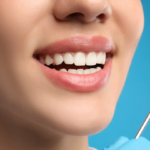
What is Tooth Enamel?
July 14, 2023
Why is My Tooth Sensitive to Cold?
August 21, 2023Key Takeaways:
Dentures Offer a Temporary or Full Replacement:
Dentures come in various types, including partial, conventional, and immediate dentures, providing options for those missing a few or all of their teeth.
Dental Implants Provide a More Permanent Solution:
Dental implants are surgically placed into the jawbone and offer a more secure, long-lasting solution compared to traditional dentures.
Choosing the Right Option Depends on Needs and Budget:
While dentures are a more affordable, non-invasive solution, implants require surgery and can be more expensive. The decision between dentures and implants should consider factors such as lifestyle, oral health, and financial considerations.
After losing one or more of your teeth, you have options to replace them and restore your smile. Dentures and dental implants both fill holes in your smile and help you enjoy eating the foods you love. Knowing what makes each of these options unique will help you work with your dentist to find the best option for your oral health.
Types of Dentures vs. Dental Implants
Dentures and dental implants each have specific types of pieces within each grouping to replace one or more of your missing teeth.
Types of Dentures
Types of dentures include immediate, complete, and partial. Complete dentures have an arch for the top teeth and one for the bottom. These replace all your teeth with a removable set custom-fit to your mouth.
Immediate dentures provide you with a full set of dentures to wear while you await the lab to make your customized complete set of dentures.
Partial dentures replace one or more missing teeth instead of your entire smile. Like complete dentures, partial dentures are customized to your mouth and removable.
Types of Dental Implants
Dental implants are surgically inserted titanium screws that replace your missing tooth roots and abutments to hold the crown or denture.
Depending on the type of implant, the dentist may place a crown or implant-supported denture on the abutments. A crown replaces a single tooth with a porcelain crown that matches your natural tooth color. Implant-supported dentures give you a complete set of dentures or partial dentures that don’t require daily removal for cleaning.
Unlike removable dentures, single-tooth and implant-supported dentures are permanently fixed in your mouth.
The Process to Get Dentures vs. Dental Implants
You should consider the processes for getting dentures and dental implants before deciding which to get. Dentures require time for a lab to manufacture your customized complete dentures. Dental implants require a series of surgeries to place the different parts in your mouth. But don’t forget the follow-up processes for each, too.
Denture Fitting Process
The dentist will take impressions or images of your teeth before pulling any remaining teeth in your mouth. These impressions give the lab the information needed to create complete dentures for your top and bottom teeth.
Next, the dentist will extract the remaining teeth and fit you with a set of immediate dentures. These protect your gums and reduce disruptions to your daily life. This immediate denture will not work as comfortably as your complete dentures, but it will offer you a way to still enjoy eating and speaking normally while you await your complete dentures.
Complete dentures will arrive after creation in the lab. They should fit comfortably in your mouth without becoming loose. If your dentures are too loose, they can cause discomfort and damage to the tissues in your mouth.
Wearing dentures does not mean that you never need to go to the dentist again. In fact, you’ll still need to maintain regular dental appointments to ensure that your dentures have a good fit and that your gums stay healthy.
Over time, natural bone loss occurs because your jaw bone does not have to support teeth any longer. This erosion of bone structure will cause your dentures to change how they fit in your mouth over time. Therefore, you will likely need to have replacement sets of dentures in the future to fit your changing jaw.
Dental Implant or Implant-Supported Denture Placement Process
Dental implants typically require two surgeries to place. You’ll first have surgery to place the titanium screw that anchors the implant. Once healed, the dentist can place the abutment and crown on top of the screw. The entire process can take up to eight months.
With implant-supported dentures fitted by Dr. Langley, you can get your permanent dentures without waiting months for your mouth to heal after having extractions. With these permanent dentures, you’ll avoid complications, such as bleeding and dry socket after extractions.
Whether you get a single-tooth dental implant or dentures supported by implants, you still need dental appointments to ensure that your other teeth and gums stay in good condition. With implants, though, you won’t have the same bone loss that people with complete dentures have. Therefore, you likely won’t need replacements for your permanent dentures because your jawbone won’t change shape.
Caring for Dentures vs. Dental Implants
Care for dentures and dental implants differ because you can remove the former and not the latter. Maintaining these dental appliances ensures you stay healthy and your smile looks excellent.
Denture Care
Caring for your dentures includes nightly removing them and using denture toothpaste to brush food particles off them. Keep dentures covered with water or denture cleaning solution whenever they are not in your mouth. Never use hot water to soak or clean dentures because the heat can damage the dentures.
Remember to keep up with regular dental visits. Your dentist can help you get replacement dentures if you need them to help you avoid the embarrassment and discomfort of wearing ill-fitting dentures. Most dental plans will cover the costs of replacement dentures once every five years. So, don’t waste your insurance benefits.
Dental Implant Care
Dental implants stay permanently in your mouth. Therefore, you care for them as you would your teeth. Brush and floss, especially if you still have natural teeth in your mouth, to prevent stains on the implant crowns and avoid inflammation and infection of your gums.
Talk to Us at Langley Dental Care for Personalized Advice on Dentures vs. Dental Implants
If you have missing teeth, talk to us at Langley Dental Care. With new dentures or implants, you’ll have a complete smile again. Our team will help you to choose whether dentures or dental implants will work best for you. Plus, our professional team has the resources to fit you with your choice. Contact us to set up your appointment for a denture or dental implant consultation. We’ll take care of you like family.



